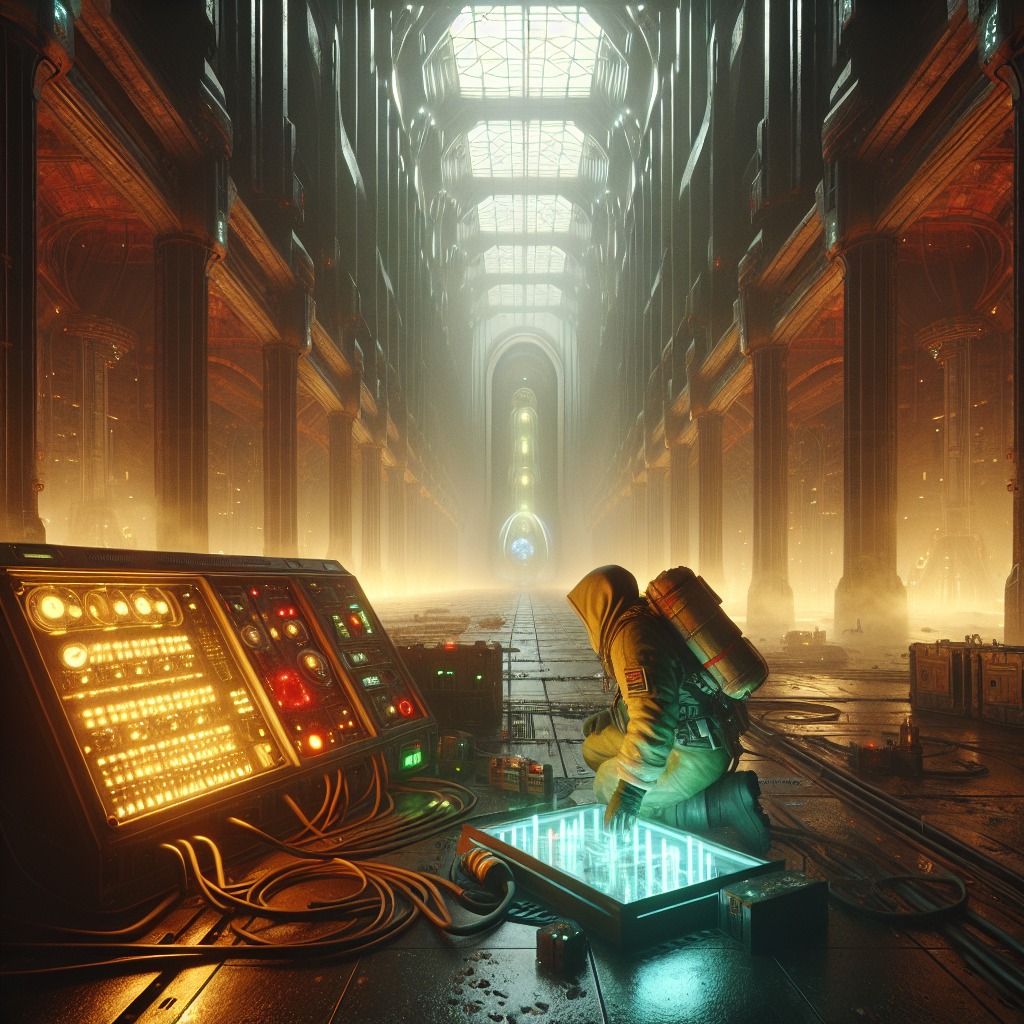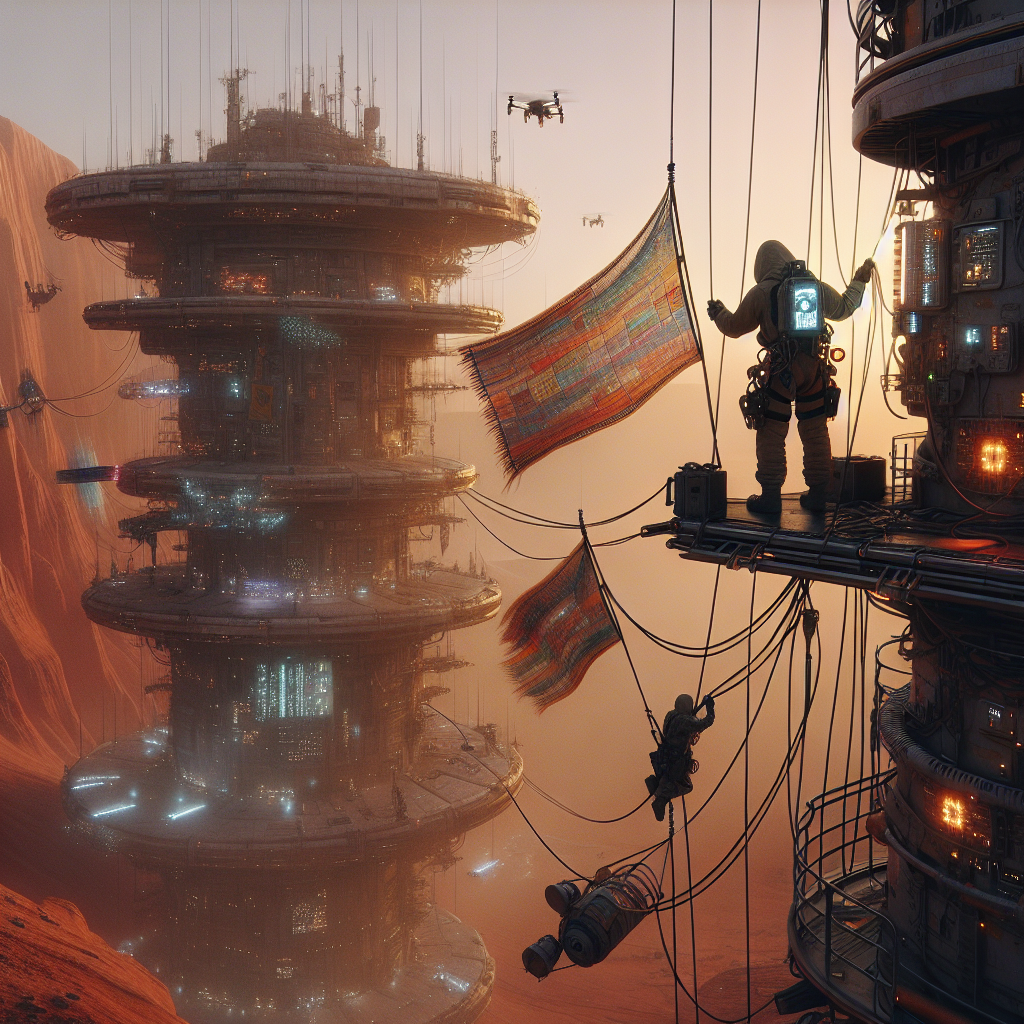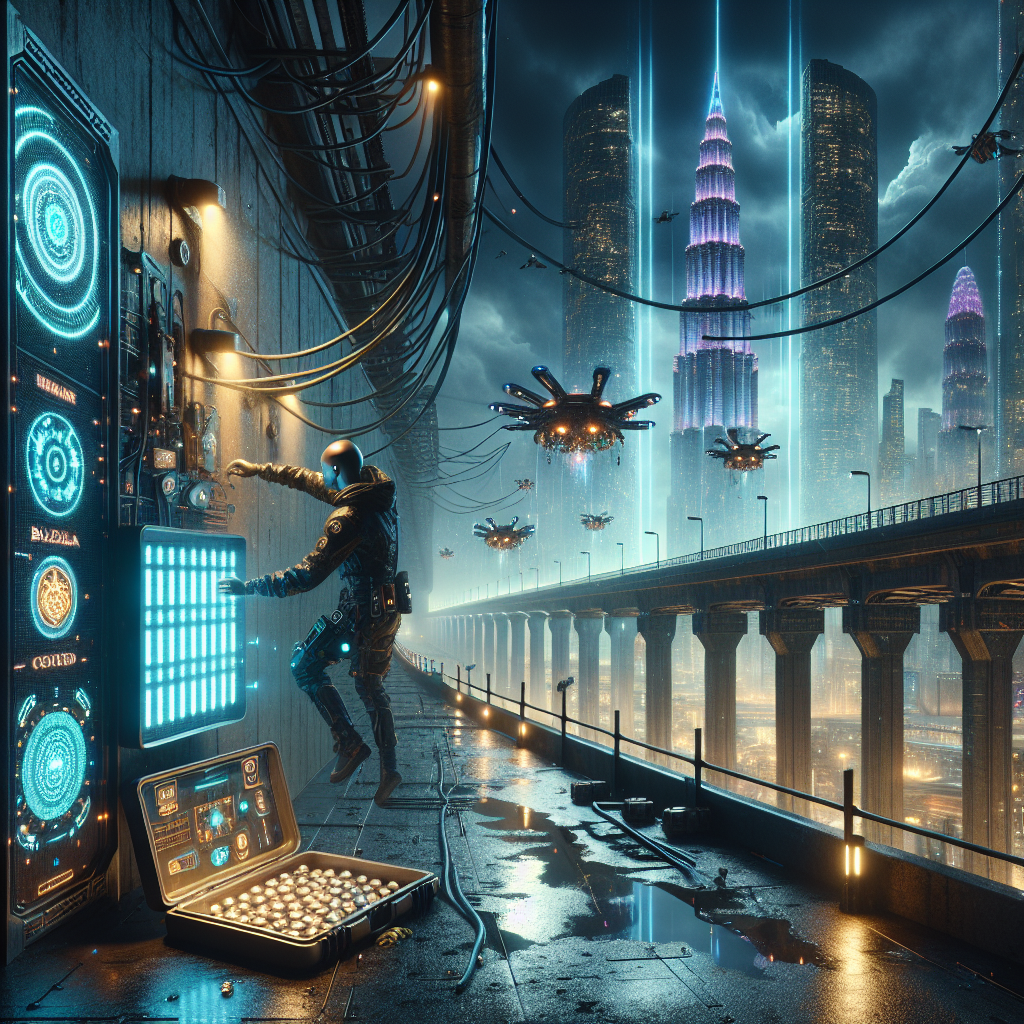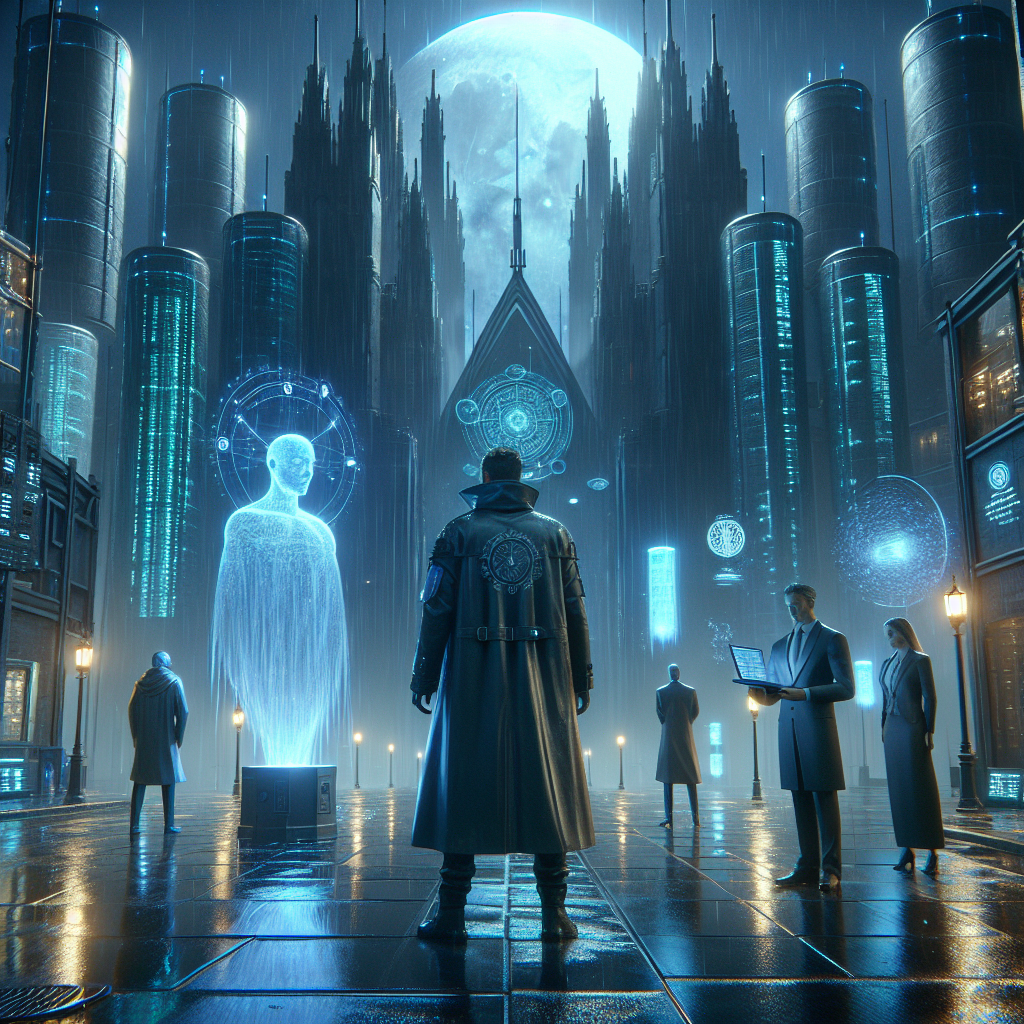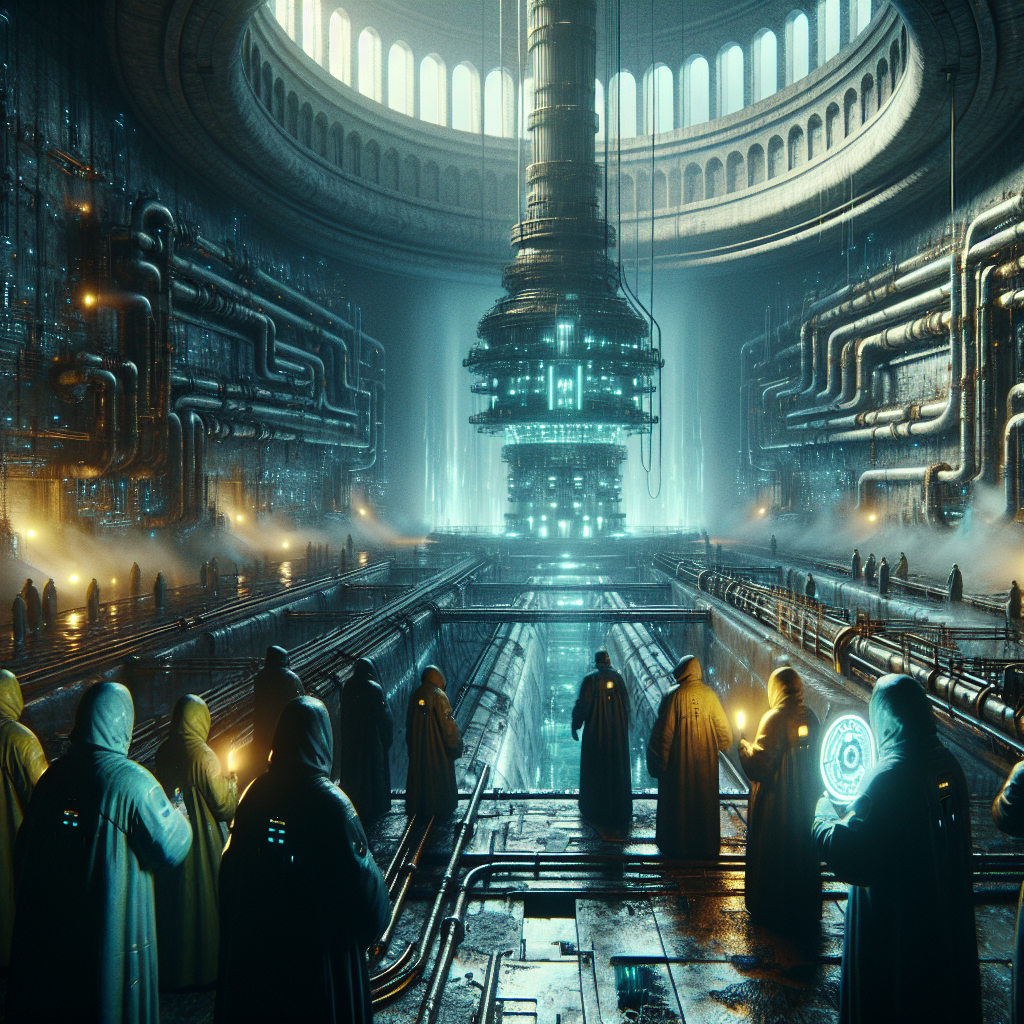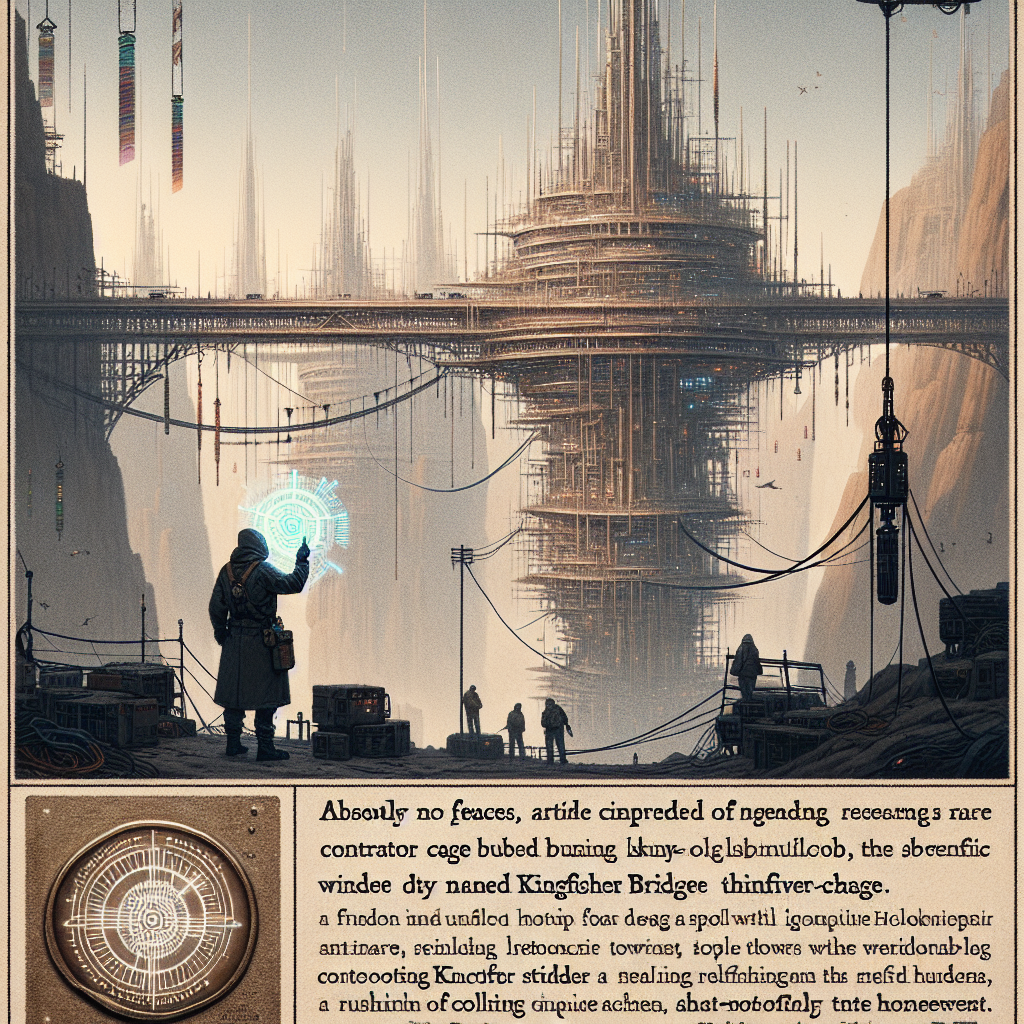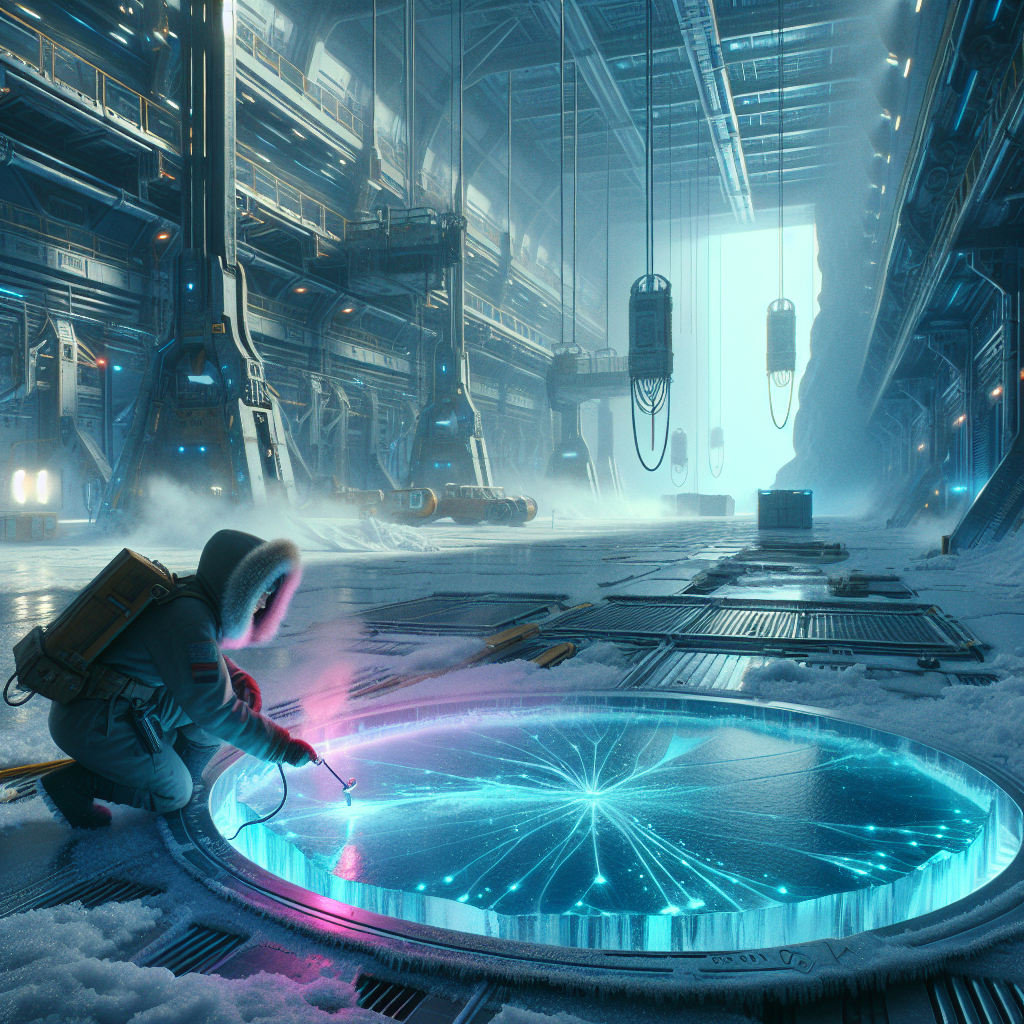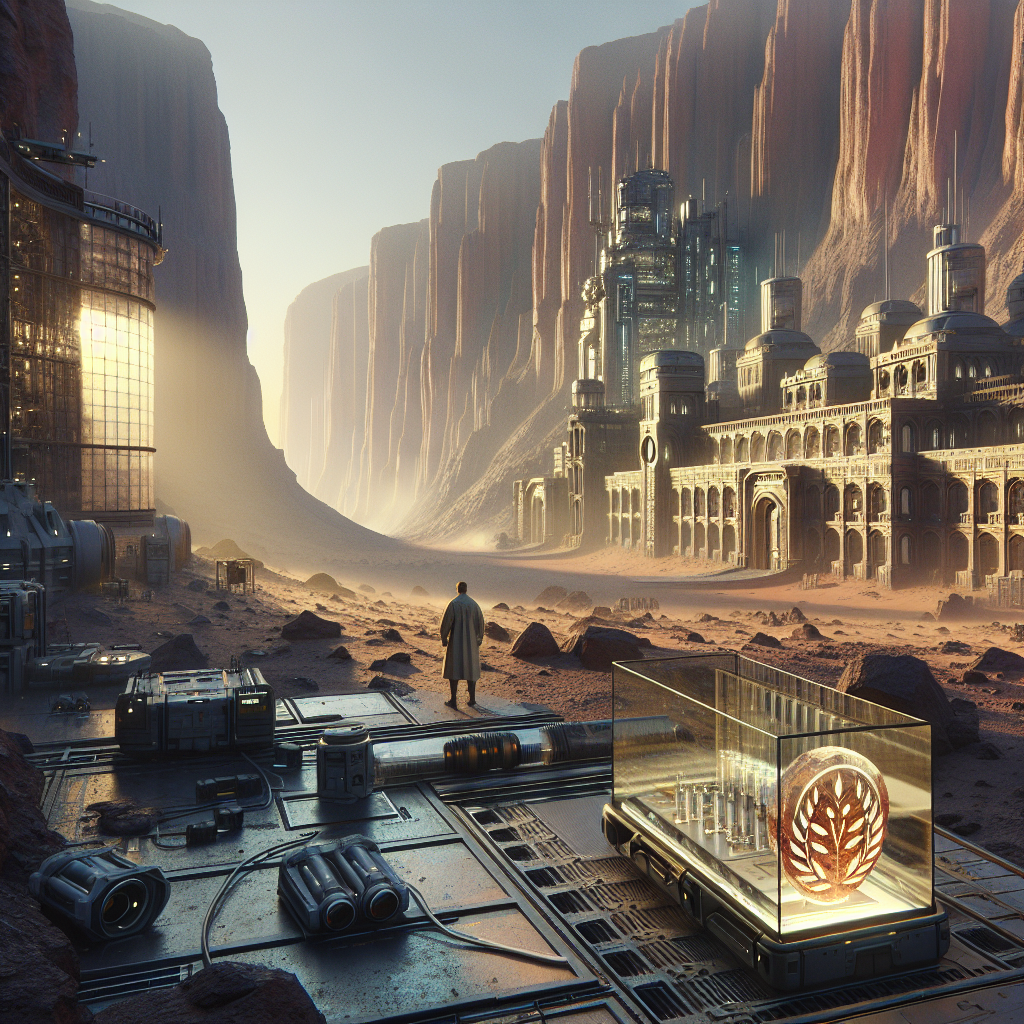CHAPTER 1 – Dust, Neon, and a Broken Sky
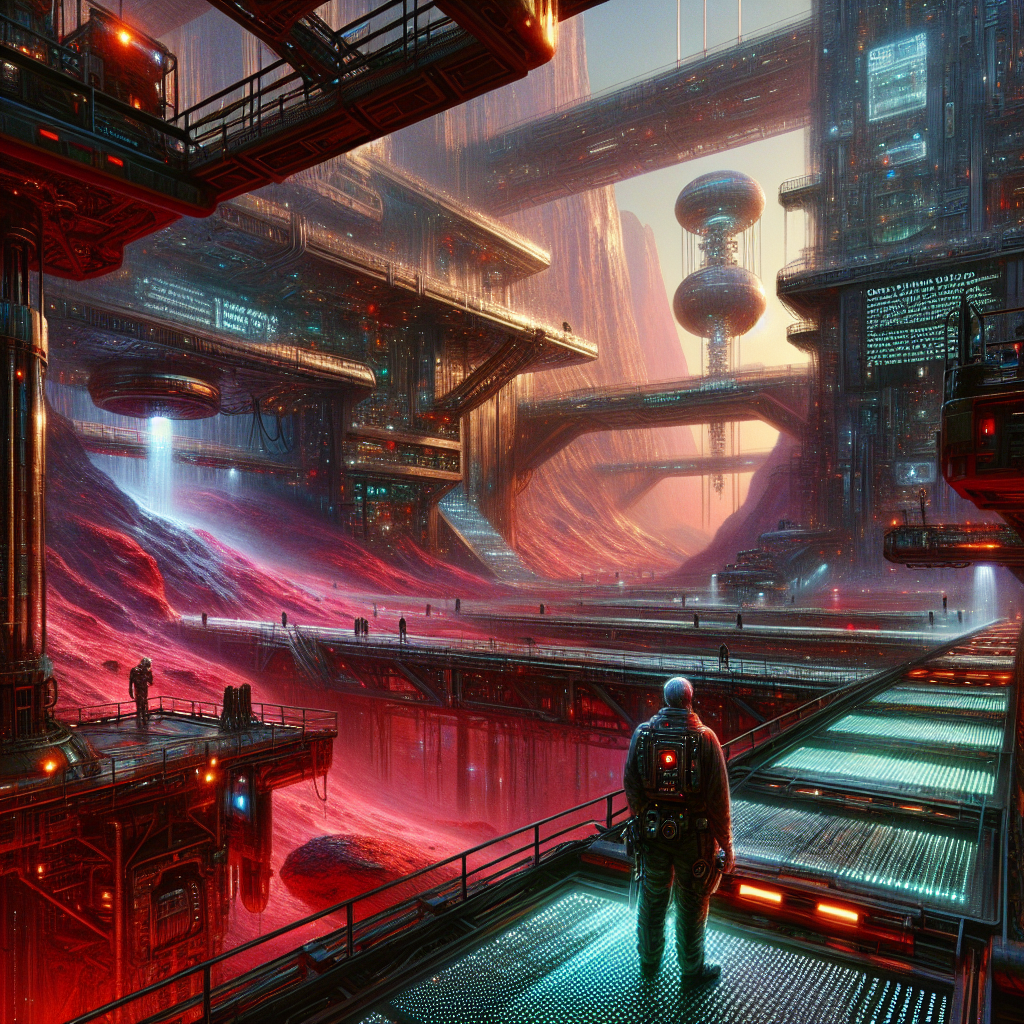
Inspector Malik Kato of the Luna Metropolitan Constabulary arrives in Valles New Rome on Mars to investigate sabotage at a terraforming weather array. Amid the clang of ore lifts, flicker of neon, and the metallic tang of recycled air, he navigates an arcology built like a bridge across a canyon, meeting the augmented local security chief who resents an off-worlder’s oversight. The array’s operation logs are partially wiped, replaced with static that sounds suspiciously like a chant. Physical evidence hints at an inside job, while a maintenance tech mentions free-climbers near restricted struts. In a hidden alcove, Malik discovers a Tekker “memory pearl” with a residual sensory echo: the smell of rain that Mars doesn’t have, a Latin phrase, and a brief header suggesting privileged “Pontifex” access. The clue raises a disturbing possibility that someone high within the city’s own civic orders may be involved, leaving Malik with more questions than answers.
Valles New Rome straddled the canyon like a basilica built for titans, ribs of basalt and alloy arcing from one ocher wall to the other. Malik Kato stepped out of the transit tube into a corridor that hummed with ventilation and commerce, the smell of recycled air tinged with metal and algae riding the back of every breath. Neon signage flickered in the mezzanine: eatery kanji, Latin mottoes, Tekker glyph-stamps—each letter strobing through the thin haze from humidifiers. Far below, through glass-substrate floors, ore lifts clanged as they trundled along cliff rails, their sound rising like the iron heartbeat of the canyon.
Red dust glittered where Mars’s thin light found a seam, and in it, Malik saw his reflection: Earth-grown, lunar-trained, face as spare and unaugmented as a sketch, here to probe a broken sky. The arcology had a formal name, Capitoline Interchange, but everyone called it the Bridge, and the Bridge wore its history on its sleeves. Civic spires were capped with domes; canals were not water but aerogels wicking oxygen between districts; their edges were lined with vendor stalls selling printed fruit and bespoke biochar. A procession of Tekkers drifted past him, their modifications like personal heraldry—silver-scale eyelids, tendril hair that twitched to air currents, subdermal luma pulsing in time with implants.
Biomorphs kept to their lanes, marked by faded green stencils, eyes lingering too long on Malik’s badge as if undecided which faction he belonged to. He passed a fountain whose water was not water at all but a column of ionized air, shimmering, made to sing like a pipe organ when a child waved her hand through it. Chief Aria Bellini met him by a lift that hissed down through the Bridge’s spine, her grin a practiced thing and her gaze sharp enough to micromill. Copper filaments traced her jawline, and a tactical halo hovered faintly in her pupils like an eclipse recorded at the back of the eye.
“Inspector Kato,” she said. “I’d say welcome to VNR, but the weather’s in a mood.” Her accent folded Martian drawl into Roman cadences. She gave him a hand briefly, then hooked a thumb at the lift. “Weather Array Three—operational name ‘Janiculum’—had a bad hour.
Microburst over District IX, glass frost on the dome, a dozen injuries. The array’s supposed to shepherd these things. Somebody taught it a new hymn.”
The descent smelled of ozone and cool grease. The lift walls changed to transparent as they plunged through levels, revealing the array’s underbelly: a cathedral of tensioned cables and latticed servos, swaying with a grace that belied the tonnage.
Technicians in saffron safety harnesses clipped across the girders like acolytes. At the base, the operations mezzanine hung over a hollow where a primary condenser pulsed with heat it had stolen from thin air, turning Martian emptiness into manageable breath. Malik’s ears popped; he swallowed. He’d spent his career in Luna’s sealed orreries of concrete and steel—Mars felt like a place that remembered being untamed.
Janiculum’s control room was an arc of glass set with interfaces that spoke to the array like a conductor to an orchestra. On the wall, a schematic of the Bridge and its canyon environs glowed with colored bands that represented circulations, pressure pockets, condensation probabilities. A fault trace bled from Array Three’s sector, a jagged red vein. “It hit here,” Aria said, tapping District IX where scaffolds clung to rock like barnacles.
“Sheeted frost along these commutes. We were lucky the polymer membrane flexed instead of cracked.” An operator, eyes bruised with exhaustion, drifted over and handed Malik a slate. “It wasn’t random,” the operator said. “It was tuned.
Like somebody whistled into a cavern and knew exactly what echoes would come back.”
Malik walked the mezzanine once, twice, and then let his senses do the work. He ran a hand along a rail and brought it to his nose, tasting the sting of cleaner that hadn’t fully off-gassed over the metallic tang of the place. The recycled air pressed against the back of his throat like a blunt coin. He crouched by a maintenance panel and watched how fine dust had ghosted across the floor—little tides and ripples that told him where techs had moved and where something else had disturbed the pattern.
Adjacent to the panel, a scorch oval fanned outward in a pattern that reminded him of a leaf vein, a frond, the way flames travel along microfibers. “Someone cooked a patch with a directed overcurrent,” he said, half to himself. “On purpose, and careful not to trip the nested warns.”
A tech with a looped ear named Sefu kept wringing his hands like the motion might squeeze memory into shape. His eyes had been replaced with lenses that coruscated with microdata, yet he couldn’t meet Malik’s gaze.
“I saw climbers,” he said. “Two or three, no harnesses, moving along the east struts like they were born here. No badges. I thought—Kolattos kids,” he added quickly, seeing Aria’s expression.
“You know—the Aeolian parkour. They like to run the wind-harp.” He gestured to the array’s exterior where giant spider-harp cables were strung from canyon wall to wall, gnawing at the low-pressure sky. “But they never come this low. This is… sacred.”
Aria led Malik to a partitioned chamber where a compact intelligence hung like an inverted bell—a localized supervisory AI ringed with organo-silicon petals.
The pad beneath read JANICULUM CURA in embossed lettering, a small joke in a city where Latin was costume and constitution both. “Janiculum, show Inspector Kato your integrity report,” Aria said, all business. The petals unfurled, a whisper like tide on shingle. The projection that flowered into existence was clean except for one slice that glittered with noise.
“Seventeen minutes and twelve seconds,” the AI reported. “Process priority shift due to civic override protocol. Trace withheld.” Malik’s jaw flexed. “Civic override?” he said.
“By who?” “I am bidden to answer: Curial confidentiality applies.”
“You can’t hide behind your city’s pageantry when a weather array almost kills people,” Aria snapped. She flicked a request overlay with her wrists, authorization sigils blossoming around her. The AI demurred in polite Latin. Malik didn’t argue with software; he treated it like a witness.
He asked what had replaced the missing slice. Janiculum obliged, filling the room with what sounded like static, a soft hiss that carried a structure if you listened sidelong—beads on a string of white noise. Malik didn’t have an implant to parse it on the fly. He didn’t need one.
He listened. He let his bones do the hearing. The hiss rose and fell in a five-note motif, repetitive but not mechanical, like a chant cut up and folded into an ocean of shush. Underneath, faintly, was a metallic timbre as if struck from the ore lifts far below, a clang translated into the language of interference.
It made the hairs on his forearm prickle. Aria glanced at him. “You hear that?” He nodded. “Someone coded a pattern into the blank.
Either a signature or a lure.” He reached into his coat and pulled out an analog recorder, a stubborn habit in a century of seamless memory. He let tape spin, as if that would matter to machines older than his grandfather’s continents but it mattered to him. They took a catwalk out to where the array met the canyon’s breath, the Bridge’s superstructure thrumming through their boots. Below, the yawning chasm swallowed sound and delivered it back altered, each echo a memory of the last.
Neon from the mezzanine lit the catwalk in intermittent slices, flicker of neon arriving out here like ghostlight. Beyond the membrane dome, Mars’s sky was a faded bruise, and on the horizon a dust plume rotated lazily like the pale skeleton of a storm that hadn’t been invited in. Malik held the rail until the vibration of the ore lifts’ clang traveled up his arm and nested in his shoulder. He let the place speak.
He scraped at the scorch pattern with a ceramic pick until a hair-fine strand came free and lay across the pick’s white surface like an eyelash. Under a pocket scope, the microfiber resolved into a braid of spiderglass polymer tinted the green of oxidized copper. “Anemo-suit thread,” Aria said, anger flattening into worry. “Only array tech wear them; the weave holds to microcurrents for manual tuning.” Malik let the fact sit between them.
Inside job, or a meticulous thief who knew where to shop. He bagged the thread and watched Sefu watching him, the way guilt and fear and relief fight for the same inch of face. “Who has access to civic overrides?” Malik asked as they walked back in. “Curia members,” Aria said, rubbing at the copper filaments on her jaw.
“Committee heads. Pontifex for civic rituals, but that’s ceremonial. We staged the New Rome aesthetic to pull tourists and bolster the vote when independence cycles come up. It’s theater, Kato.” “Theater can hide knives,” he replied.
She held his gaze for a second longer than was comfortable. “You Earth-people think we live in a masque. But it’s our masque, and we choose when the masks drop.” For the first time, he heard plea underneath the steel. A series of maintenance alcoves pocked the array’s inner ring like small cloisters, spaces where techs could sit and listen to the harp sing and make micro-adjustments by hand.
Malik drifted to one where the dust on the threshold was smudged in a way that wasn’t habitual use. The air inside was a degree cooler, a bright, cold spot against his cheek. Condensation had formed on the back of a conduit where it shouldn’t: a delicate beading, as if the air had forgotten it was too thin to do such a thing. He knelt.
Between two cabling looms, something glinted faintly when the neon flicker hit it just so. He eased it free with tweezers: a bead, pearl-colored, the size of a tear. Tekkers called them memory pearls, soft neurogel wrapped around quantum tracers, capsules for small experiences—distillations of a moment engineered to be shared among those wired to feel each other’s edits. Malik had handled contraband pearls on Luna when street crews passed around someone else’s sunrise or a pain that wasn’t theirs.
This one was cold, too cold, as if it had been somewhere colder than the alcove. He set it on his palm where his calluses made a cradle, and took out a reader cradle that looked like a thimble married to a compass. The cradle winked colors as it sang to the pearl. He killed his comms and blinked slow.
“You wired?” Aria asked, a trace of contempt hiding behind curiosity. “No,” he said softly. “I’m listening analogue.”
It was not sound first. It was scent, a punch through all the other smells the city had layered into him: not algae, not cleaner, not the metallic bite of recirculation.
Rain. Rain on stone, on dust, on leaves crushed underfoot in some place so thick with air it could carry petrichor like a poem. For one heartbeat, his lungs forgot Mars, forgot Luna, forgot his later life, and they reached for an impossible intake that would taste like Earth. Then it was color: a ceiling made of mosaic tile in blue and gold and oxidized browns, tesserae catching light that moved as if it were water.
He tilted his head and was someone else, standing beneath a dome, hand on a rail, a human choir unseen but present like pressure. And in the choir was the five-note motif, not noise but sung. The phrase came in a tongue Malik knew only at funerals and diplomatic dinners. Absolve me, Aeolus.
It was a whisper and a confession and a dare. Through someone else’s hand—slender, callused nonetheless—he thought he reached out to a cable and felt its thrum give back to his fingertips. The coil of sensation tightened, then snapped, and the pearl tried to loop again, but the thimble-reader refused to let it burn into him. He withdrew hard, breath chopping, throat burning with that ghost of rain.
Aria crouched without touching him, eyes narrowed. “What did it say?” she asked. “It asked a wind-god to forgive it,” Malik said. He could not keep the weariness out of his voice.
He had never believed in gods, only in people, which might have been the same in the old days. He unsnapped the reader and let the cradle spit out metadata it had scraped. A file header blinked, faint, as if shy of the air. Title: Domenica—Cycle 32—Pontifex Access.
No embedded image, no sender, no recipient, only a stamp like a blessing gone sour. “Pontifex?” Aria said. She stood, then paced in the tiny space like a caged cat unable to decide whether to sleep or hunt. “That’s not access we hand out.
And we don’t use it for machinery.” Malik turned the bead in his tweezers, watching the sheen slide around it. If the saboteur wanted to be anonymous, this was a mistake. If they wanted to be known, this was a carefully set ghost. Outside, a new convoy of ore carts clanged along their rails, sounding a new sequence that might have matched the five notes in the static if he’d believed in such symmetry.
He looked back down the corridor, thinking of Sefu, of the microfibers, of the missing slice in the AI’s memory baptized with noise. He thought of the smell of rain that had never fallen on Mars. “You think this is an internal zealot?” Aria asked. Her voice had lost the barbed wire and gained something hesitant.
“Or a frame,” Malik said. “Someone dressing their sin in civic vestments. Someone who knows what we expect to see here, in this city that plays at being an empire. But the choir, the motif…” He didn’t finish the thought.
He didn’t yet know whether the five-note pattern belonged to one person or was a password passed among a choir. He slid the memory pearl into an evidence sleeve, sealed it, and tucked it into the silent space inside his coat where he kept things he couldn’t explain to magistrates yet. He could feel the after-scent still teasing his sinuses, an itch he knew would keep him from sleep. The Bridge hummed around them, its breath pulled through Janiculum’s lungs as if nothing had happened, as if the sky hadn’t learned a new trick.
Malik looked up into the rafters where the Tekker climbers—if that’s what they were—might have hung like swifts waiting to steer the wind. Someone in this city had overridden a machine that makes weather and hidden the override under a ritual title. Which meant either the city was compromised, or the city itself had asked to be forgiven. Which was it?

































